2022年中考英语复习---动词的时态课件(共23张PPT)
文档属性
| 名称 | 2022年中考英语复习---动词的时态课件(共23张PPT) | 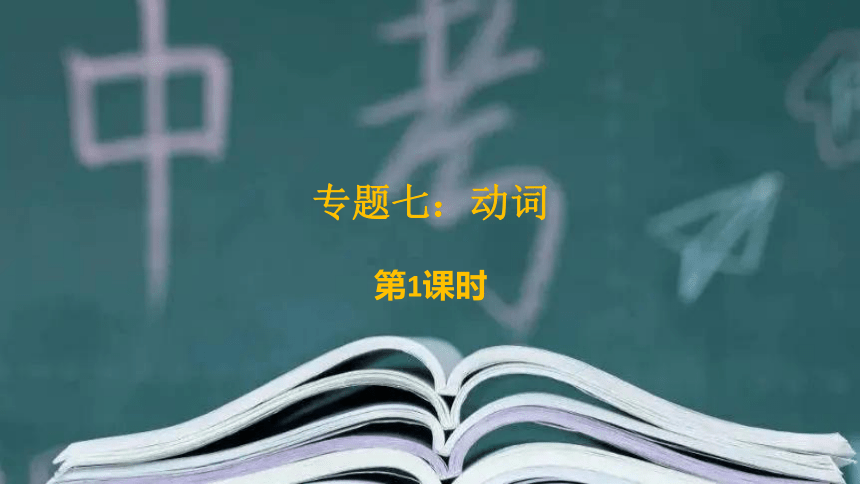 | |
| 格式 | zip | ||
| 文件大小 | 210.8KB | ||
| 资源类型 | 教案 | ||
| 版本资源 | 人教新目标(Go for it)版 | ||
| 科目 | 英语 | ||
| 更新时间 | 2022-10-09 18:19:22 | ||
图片预览

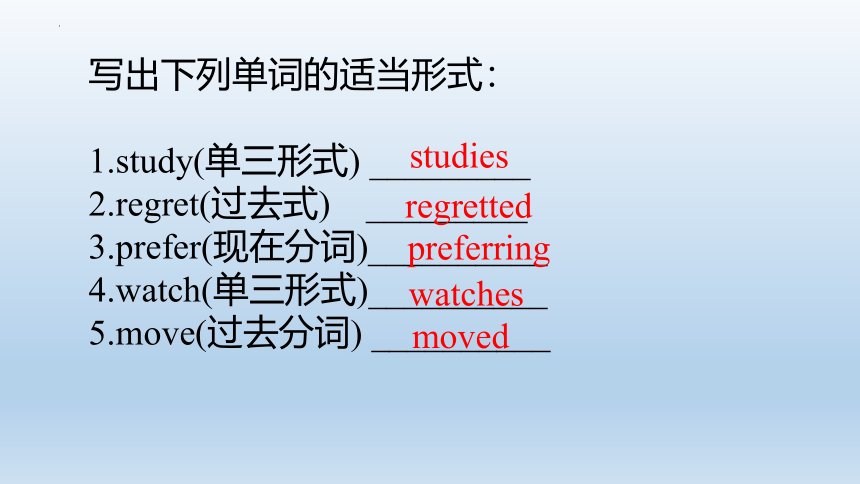
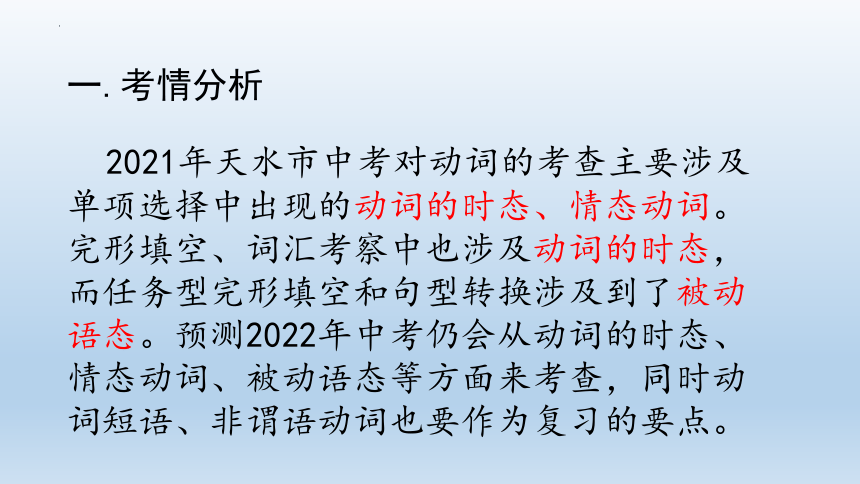
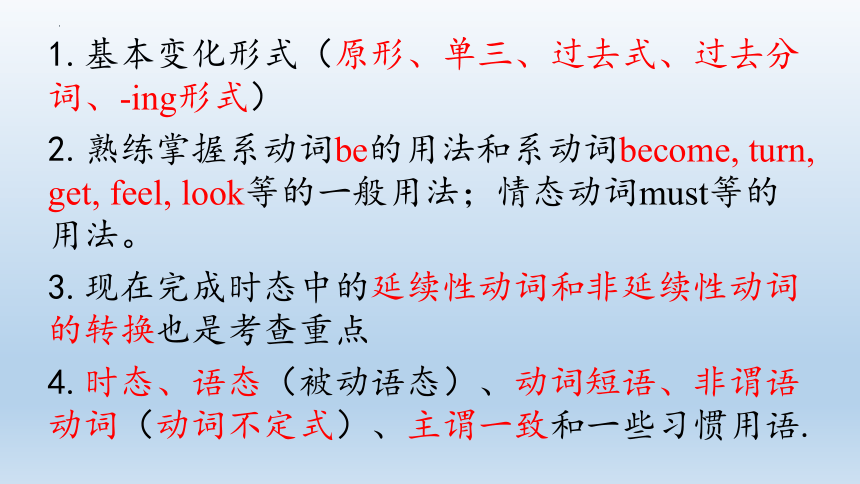
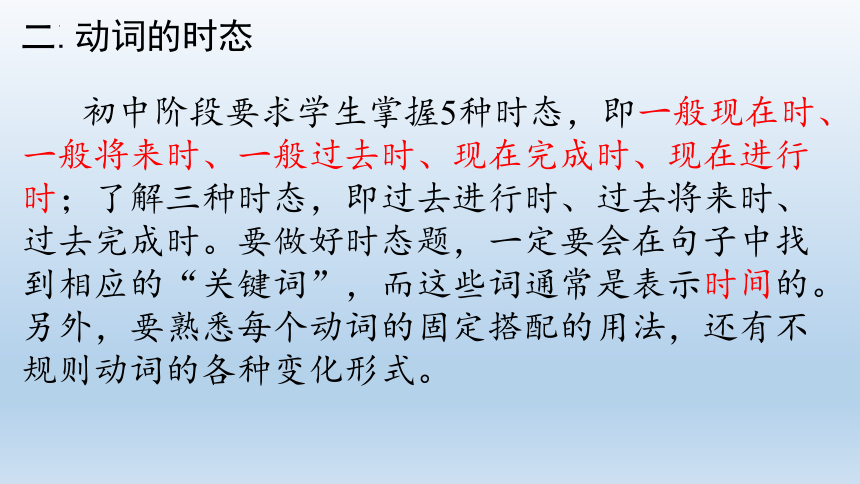

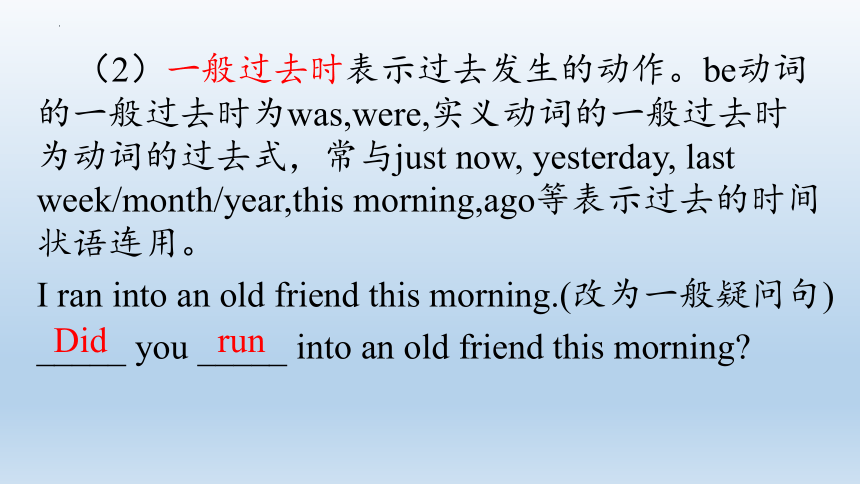
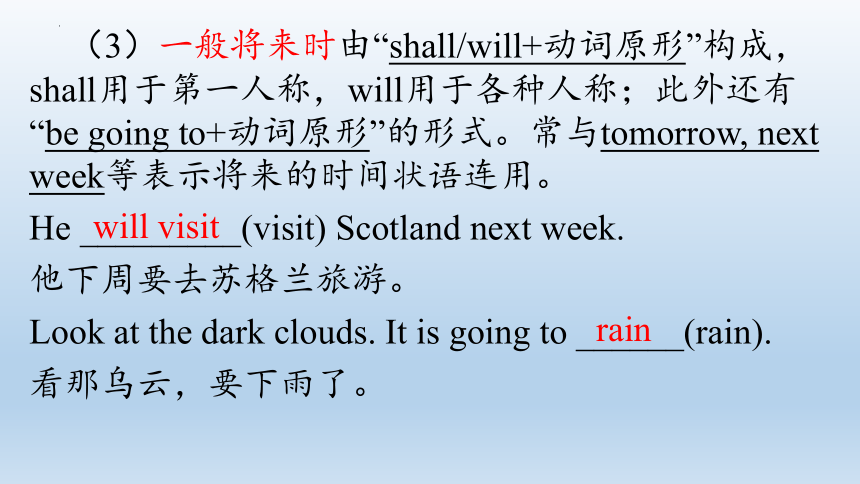
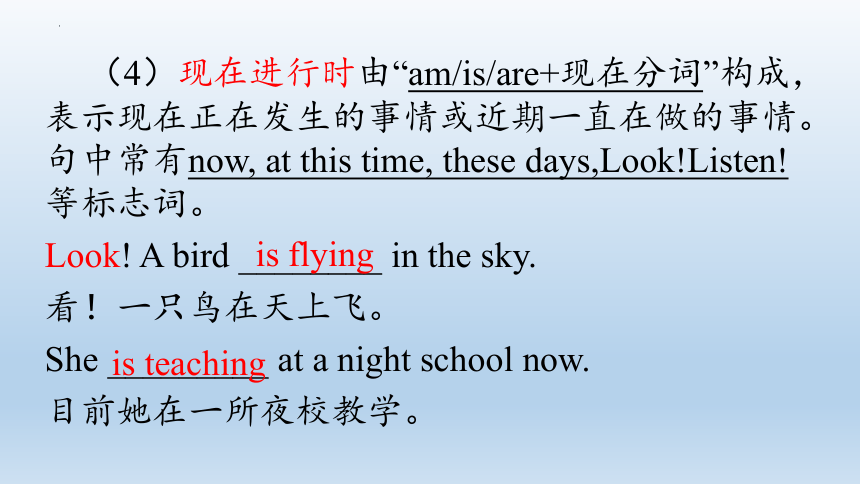
文档简介
(共23张PPT)
专题七:动词
第1课时
写出下列单词的适当形式:
1.study(单三形式) _________
2.regret(过去式) _________
3.prefer(现在分词)__________
4.watch(单三形式)__________
5.move(过去分词) __________
studies
regretted
preferring
watches
moved
2021年天水市中考对动词的考查主要涉及单项选择中出现的动词的时态、情态动词。完形填空、词汇考察中也涉及动词的时态,而任务型完形填空和句型转换涉及到了被动语态。预测2022年中考仍会从动词的时态、情态动词、被动语态等方面来考查,同时动词短语、非谓语动词也要作为复习的要点。
一.考情分析
1.基本变化形式(原形、单三、过去式、过去分词、-ing形式)
2.熟练掌握系动词be的用法和系动词become, turn, get, feel, look等的一般用法;情态动词must等的用法。
3.现在完成时态中的延续性动词和非延续性动词的转换也是考查重点
4.时态、语态(被动语态)、动词短语、非谓语动词(动词不定式)、主谓一致和一些习惯用语.
初中阶段要求学生掌握5种时态,即一般现在时、一般将来时、一般过去时、现在完成时、现在进行时;了解三种时态,即过去进行时、过去将来时、过去完成时。要做好时态题,一定要会在句子中找到相应的“关键词”,而这些词通常是表示时间的。另外,要熟悉每个动词的固定搭配的用法,还有不规则动词的各种变化形式。
二.动词的时态
(1)一般现在时表示经常性、习惯性的动作或表示客观真理。常与often, usually, always等时间状语连用。
She often _____ on the weekend. 她经常在周末工作。
Jim practices the guitar in the club on Saturday afternoons.(改为否定句)
Jim _______ _______ the guitar in the club on Saturday afternoons.
works
doesn’t
practice
(2)一般过去时表示过去发生的动作。be动词的一般过去时为was,were,实义动词的一般过去时为动词的过去式,常与just now, yesterday, last week/month/year,this morning,ago等表示过去的时间状语连用。
I ran into an old friend this morning.(改为一般疑问句)
_____ you _____ into an old friend this morning
Did
run
(3)一般将来时由“shall/will+动词原形”构成,shall用于第一人称,will用于各种人称;此外还有“be going to+动词原形”的形式。常与tomorrow, next week等表示将来的时间状语连用。
He _________(visit) Scotland next week.
他下周要去苏格兰旅游。
Look at the dark clouds. It is going to ______(rain).
看那乌云,要下雨了。
will visit
rain
(4)现在进行时由“am/is/are+现在分词”构成,表示现在正在发生的事情或近期一直在做的事情。句中常有now, at this time, these days,Look!Listen!等标志词。
Look! A bird ________ in the sky.
看!一只鸟在天上飞。
She _________ at a night school now.
目前她在一所夜校教学。
is flying
is teaching
(5)过去进行时由“was/were十现在分词”构成,表示过去某一时间正在发生的事情或过去某段时间一直在做的事情。常与at this time yesterday, at that time或以when引导的谓语动词是一般过去时的句子等连用。
She ___________ TV at this time yesterday.
昨天这个时候她正在看电视。
They ___________ for me when I arrived there.
当我到达那里时他们正在等我。
was watching
were waiting
(6)现在完成时由“have/has+过去分词”构成.
①表示发生在过去的或已经完成的对现在仍有影响的动作。
I have lost my key.
I have already seen the film.
②表示一个动作或者状态发生在过去,并持续到现在,可能还要持续下去;
Mr. Zhang has taught English for 20 years.
常与现在完成时连用的时间状语有already, yet, never, ever, just, before, so far, up to now, until now, by now, in the past/last few years, for+一段时间,since+时间点/从句。
I have lived in Jinan since 10 years ago.
自从10年前我就一直在济南居住。
I have never heard of this story before.
我以前从没听过这个故事。
He has just come back from America.
In the past five years, the number of students in our school bigger and bigger.
A.becomes
B.became
C.have become
D.has become
D
★当句中有How long. . . /since+时间点 /for+时间段等时间状语时,句中动词要用延续性动词。非延续性动词与延续性动词的转换如下:
buy→have; borrow→keep; open→be open;
close→be closed; begin/start→be on;
come→be here; go→be there;die→be dead;
catch a cold→have a cold; fall asleep→be asleep;
join→be in/be a member of; leave→be away
marry→be married
He married two years ago.(改为同义句)
He ______ _______ married for two years.
has been
三.易错知识
1.have/has been to 和 have/has gone to
have/has been to 曾经去过某地,(人已经回来)
have/has gone to 已经去某地,(在路上或者已经到达那里)
Andy, with his parents, _________ to Hong Kong, and they will stay there for a week.
A.have gone
B.has gone
C.have been
D.has been
B
2.宾语从句谓语动词的时态常常受到主句时态的影响,因而在使用时要注意主从句两部分的时态保持一致。一般要遵循以下原则:
① 主句是一般现在时,宾语从句的时态可以是任何适当的时态。所以,宾语从句的时态应根据实际情况而定。
She says(that) she works from Monday to Friday.她说她从周一至周五上班。(从句是一般现在时)
She says(that) she will sell the old books back to the school bookstore.她说她要把旧书卖给学校的书店。(从句是一般将来时)
She says(that) she has never seen the sea.
她说她从来没有见过大海。(从句是现在完成时)
② 主句是一般过去时,宾语从句的时态一般要用适当的过去时态。
He said there were no classes yesterday afternoon.
他说昨天下午没有课。(从句是一般过去时)
He said that he was going to buy some new books.
他说他打算去买一些新书。(从句是过去将来时)
He said that they were having a class at that time.
他说他们那时正在上课。(从句是过去进行时)
③ 当宾语从句是表示客观事实、普遍真理、自然现象等,不管主句用什么时态,从句时态都用一般现在时。
The teacher told us that nothing is difficult if we put our hearts into it.
老师告诉我们世上无难事,只怕有心人。
He said that the earth travels around the sun.
他说地球围绕太阳转。
Are you doing the dishes He asked his mother.
(合并为一句)
He asked his mother ______ ______ _____ doing the dishes.
if/whether
she
was
—Do you know ______
—Yes. In five minutes.
A.when does the No.11 bus leave
B.when will the No.11 bus leave
C.when the No.11 bus left
D. when the No.11 bus will leave
B
专题七:动词
第1课时
写出下列单词的适当形式:
1.study(单三形式) _________
2.regret(过去式) _________
3.prefer(现在分词)__________
4.watch(单三形式)__________
5.move(过去分词) __________
studies
regretted
preferring
watches
moved
2021年天水市中考对动词的考查主要涉及单项选择中出现的动词的时态、情态动词。完形填空、词汇考察中也涉及动词的时态,而任务型完形填空和句型转换涉及到了被动语态。预测2022年中考仍会从动词的时态、情态动词、被动语态等方面来考查,同时动词短语、非谓语动词也要作为复习的要点。
一.考情分析
1.基本变化形式(原形、单三、过去式、过去分词、-ing形式)
2.熟练掌握系动词be的用法和系动词become, turn, get, feel, look等的一般用法;情态动词must等的用法。
3.现在完成时态中的延续性动词和非延续性动词的转换也是考查重点
4.时态、语态(被动语态)、动词短语、非谓语动词(动词不定式)、主谓一致和一些习惯用语.
初中阶段要求学生掌握5种时态,即一般现在时、一般将来时、一般过去时、现在完成时、现在进行时;了解三种时态,即过去进行时、过去将来时、过去完成时。要做好时态题,一定要会在句子中找到相应的“关键词”,而这些词通常是表示时间的。另外,要熟悉每个动词的固定搭配的用法,还有不规则动词的各种变化形式。
二.动词的时态
(1)一般现在时表示经常性、习惯性的动作或表示客观真理。常与often, usually, always等时间状语连用。
She often _____ on the weekend. 她经常在周末工作。
Jim practices the guitar in the club on Saturday afternoons.(改为否定句)
Jim _______ _______ the guitar in the club on Saturday afternoons.
works
doesn’t
practice
(2)一般过去时表示过去发生的动作。be动词的一般过去时为was,were,实义动词的一般过去时为动词的过去式,常与just now, yesterday, last week/month/year,this morning,ago等表示过去的时间状语连用。
I ran into an old friend this morning.(改为一般疑问句)
_____ you _____ into an old friend this morning
Did
run
(3)一般将来时由“shall/will+动词原形”构成,shall用于第一人称,will用于各种人称;此外还有“be going to+动词原形”的形式。常与tomorrow, next week等表示将来的时间状语连用。
He _________(visit) Scotland next week.
他下周要去苏格兰旅游。
Look at the dark clouds. It is going to ______(rain).
看那乌云,要下雨了。
will visit
rain
(4)现在进行时由“am/is/are+现在分词”构成,表示现在正在发生的事情或近期一直在做的事情。句中常有now, at this time, these days,Look!Listen!等标志词。
Look! A bird ________ in the sky.
看!一只鸟在天上飞。
She _________ at a night school now.
目前她在一所夜校教学。
is flying
is teaching
(5)过去进行时由“was/were十现在分词”构成,表示过去某一时间正在发生的事情或过去某段时间一直在做的事情。常与at this time yesterday, at that time或以when引导的谓语动词是一般过去时的句子等连用。
She ___________ TV at this time yesterday.
昨天这个时候她正在看电视。
They ___________ for me when I arrived there.
当我到达那里时他们正在等我。
was watching
were waiting
(6)现在完成时由“have/has+过去分词”构成.
①表示发生在过去的或已经完成的对现在仍有影响的动作。
I have lost my key.
I have already seen the film.
②表示一个动作或者状态发生在过去,并持续到现在,可能还要持续下去;
Mr. Zhang has taught English for 20 years.
常与现在完成时连用的时间状语有already, yet, never, ever, just, before, so far, up to now, until now, by now, in the past/last few years, for+一段时间,since+时间点/从句。
I have lived in Jinan since 10 years ago.
自从10年前我就一直在济南居住。
I have never heard of this story before.
我以前从没听过这个故事。
He has just come back from America.
In the past five years, the number of students in our school bigger and bigger.
A.becomes
B.became
C.have become
D.has become
D
★当句中有How long. . . /since+时间点 /for+时间段等时间状语时,句中动词要用延续性动词。非延续性动词与延续性动词的转换如下:
buy→have; borrow→keep; open→be open;
close→be closed; begin/start→be on;
come→be here; go→be there;die→be dead;
catch a cold→have a cold; fall asleep→be asleep;
join→be in/be a member of; leave→be away
marry→be married
He married two years ago.(改为同义句)
He ______ _______ married for two years.
has been
三.易错知识
1.have/has been to 和 have/has gone to
have/has been to 曾经去过某地,(人已经回来)
have/has gone to 已经去某地,(在路上或者已经到达那里)
Andy, with his parents, _________ to Hong Kong, and they will stay there for a week.
A.have gone
B.has gone
C.have been
D.has been
B
2.宾语从句谓语动词的时态常常受到主句时态的影响,因而在使用时要注意主从句两部分的时态保持一致。一般要遵循以下原则:
① 主句是一般现在时,宾语从句的时态可以是任何适当的时态。所以,宾语从句的时态应根据实际情况而定。
She says(that) she works from Monday to Friday.她说她从周一至周五上班。(从句是一般现在时)
She says(that) she will sell the old books back to the school bookstore.她说她要把旧书卖给学校的书店。(从句是一般将来时)
She says(that) she has never seen the sea.
她说她从来没有见过大海。(从句是现在完成时)
② 主句是一般过去时,宾语从句的时态一般要用适当的过去时态。
He said there were no classes yesterday afternoon.
他说昨天下午没有课。(从句是一般过去时)
He said that he was going to buy some new books.
他说他打算去买一些新书。(从句是过去将来时)
He said that they were having a class at that time.
他说他们那时正在上课。(从句是过去进行时)
③ 当宾语从句是表示客观事实、普遍真理、自然现象等,不管主句用什么时态,从句时态都用一般现在时。
The teacher told us that nothing is difficult if we put our hearts into it.
老师告诉我们世上无难事,只怕有心人。
He said that the earth travels around the sun.
他说地球围绕太阳转。
Are you doing the dishes He asked his mother.
(合并为一句)
He asked his mother ______ ______ _____ doing the dishes.
if/whether
she
was
—Do you know ______
—Yes. In five minutes.
A.when does the No.11 bus leave
B.when will the No.11 bus leave
C.when the No.11 bus left
D. when the No.11 bus will leave
B
同课章节目录
- 词法
- 名词
- 动词和动词短语
- 动词语态
- 动词时态
- 助动词和情态动词
- 非谓语动词
- 冠词
- 代词
- 数词和量词
- 形容词副词及其比较等级
- 介词和介词短语
- 连词和感叹词
- 构词法
- 相似、相近词比较
- 句法
- 陈述句
- 一般疑问句和否定疑问句
- 特殊疑问句及选择疑问句
- 反意疑问句
- 存在句(There be句型)
- 宾语从句
- 定语从句
- 状语从句
- 主谓一致问题
- 简单句
- 并列句
- 复合句
- 主谓一致
- 主、表语从句
- 名词性从句
- 直接引语和间接引语
- 虚拟语气
- 感叹句
- 强调句
- 倒装句
- 祈使句
- 句子的成分
- 句子的分类
- 题型专区
- 单项选择部分
- 易错题
- 完形填空
- 阅读理解
- 词汇练习
- 听说训练
- 句型转换
- 补全对话
- 短文改错
- 翻译
- 书面表达
- 任务型阅读
- 语法填空
- 其他资料
